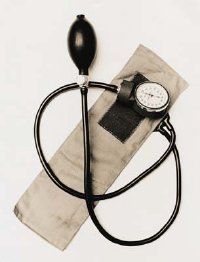To reduce high blood pressure, it's important to eat fewer foods rich in sodium if you are sensitive to this mineral. Processed foods account for 80 percent of the sodium in most diets. It is helpful to increase the amount of potassium, calcium, and magnesium in your diet. Most vegetables and fruits in the garden are rich in potassium. Broccoli and dark leafy greens are full of magnesium and calcium, except for spinach and Swiss chard, whose calcium is unavailable for absorption. Researchers have found that celery contains a substance that lowers blood pressure; the Chinese have used celery for this purpose for centuries.
Garlic helps lower blood pressure by keeping the arteries clear of cholesterol and potential plaque buildup. It also decreases blood clotting and widens the arteries. Hawthorn berries and ginkgo biloba are reputed to dilate arteries, too, making the heart's job of pushing blood through them a little easier.
Passion flower, valerian, limeflower (Tilia cordata), and lemon balm have sedative properties, so if your blood pressure condition is thought to be connected to stress and anxiety, tranquilizing herbs such as these can lend a hand without side effects. Valerian also relaxes the smooth muscles that line the artery walls, preventing them from constricting.
Low blood pressure can be treated with herbs that stimulate circulation. Cayenne pepper, horseradish, and angelica may be helpful. Licorice tea may also increase blood pressure.



